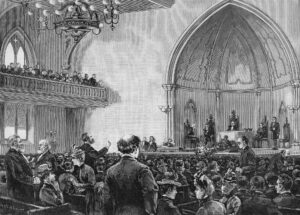The tradition of Baptist political theology is usually taken to originate with A Short Declaration of the Mystery of Iniquity (1612) by the English General Baptist Thomas Helwys (ca.1550–ca.1616). Along with John Smyth (ca.1570–1612), Helwys had established a congregation in the town of Gainsborough, Lincolnshire, that was not part of the state church, namely, the Church of England. They refused to accept anyone into the membership of the church unless that person could give a credible testimony of saving faith. Their congregation was part of a number of churches, now known as Separatists, who were seeking to return to a biblical ecclesiology and who had given up the hope that the state church could ever be truly reformed along biblical lines.
In the course of 1607, though, pressure by state authorities to conform to the established church grew severe enough to prompt Smyth and Helwys to seek refuge for their congregation in Holland, which was a haven of religious freedom at the time. Having relocated their Separatist congregation in Amsterdam by 1608, Smyth and Helwys continued to search the Scriptures for the New Testament blueprint of church life. They became convinced that their infant baptism in the Church of England was invalid since the Church of England was not a true church. As they searched the Scriptures on this subject of baptism, they were led to Baptistic convictions, and when Smyth despaired of finding someone to administer the rite of baptism, he baptized himself and then baptized Helwys and the rest of their small congregation.
Sadly, Smyth and a number of the congregation subsequently left this fledgling body of English Baptists for a Dutch Mennonite community when Smyth and Helwys came to differing convictions regarding Christology and the administration of the ordinances, leaving Thomas Helwys to lead the congregation back to England around 1612. Helwys’ The Mystery of Iniquity seems to have been published in Amsterdam prior to this return to England. In fact, the book may well have led to Helwys’ subsequent arrest and death in a London prison around 1616.
For the modern reader, much of The Mystery of Iniquity is not an easy read, since the book not only espoused the standard Puritan critiques of the Roman church and the episcopacy of the Church of England, but also contained a bitter attack on all of the Puritans who had stayed within the English state church as well as the paedobaptist Separatists who had set up independent congregations as “false prophets.” Having once been a Separatist prior to his embrace of Baptist convictions might explain the severity of Helwys’ remarks about the Separatists: their congregations were those of “infidels or unbelievers that are not joined to Christ, and have not put on Christ by baptism.”
The book has been remembered in the Baptist tradition, though, because of Helwys’ celebrated assertion that
men’s religion to God is between God and themselves. The king shall not answer for it. Neither may the king be judge between God and man. Let them be heretics, Turks [that is, Muslims], Jews, or whatsoever, it appertains not to the earthly power to punish them in the least measure.
What is notable about this remark is that very few in his world or era upheld such a radical idea of religious liberty. But, for Helwys, it was derived from his conviction that “an earthly sword is ordained of God only for an earthly power, and a spiritual sword for a spiritual power.” Helwys sent a copy of his book to the monarch, James I (1566–1625), with a handwritten note penned on the flyleaf of the book, in which he boldly—though many in that day would have said, recklessly—told the king:
The king is a mortal man & not God, therefore hath no power over the immortal souls of his subjects, to make laws & ordinances for them, and to set spiritual lords over them. If the king have authority to make spiritual lords & laws, then he is an immortal God and not a mortal man.
According to Helwys, his central desire in the book was that his monarch might allow his people to “enjoy … blessed liberty to understand the Scriptures with their own understanding and pray in their public worship with their own spirits.” Indeed, as Barrie White has noted, an often-overlooked goal of Helwys’ book was to persuade James I “to dismantle the whole of the power of the state establishment of the episcopal church.”
Although Helwys’ fervent appeal for religious liberty as well as universal religious toleration has been deeply appreciated and heralded by Baptists from the Victorian era to the present day, this appeal was largely forgotten between his day and the close of the Georgian era. In fact, there are only five extant copies of the 1612 edition of The Mystery of Iniquity and the work was not published again until 1935 when it appeared in a facsimile edition. Moreover, given the fact that within a century of the founding of the General Baptists, the denomination was in dire straits theologically—many of the congregations were moving in the directions of either Unitarianism or an heterodox Christology during the Georgian era—the organic influence of Helwys on immediate subsequent Baptist political theology is further diminished.
Our next installment will examine who or what then is at the fountainhead of seventeenth-century English Baptist political thought?
























